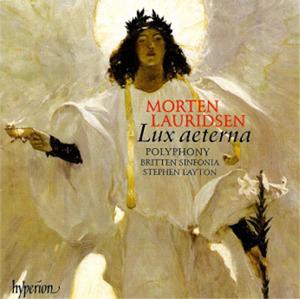

The Los Angeles Times referred to Lauridsen as "a choral hit man" for the Millennium and called his Lux aeterna CD "stunning!" in its best of 1998 review.
Flannagan added, "I met Lauridsen several times and got to know him -- at conferences and on two occasions when the college choir performed his works at Carnegie Hall in New York. Lauridsen is very accessible. He came to all our rehearsals in New York." Flannagan recalled that Lauridsen gave the conductor and his students helpful comments and talked about why he wrote the music. He also talked to students after the rehearsal. When Lauridsen won the 2007 National Medal of Arts, Flannagan asked him to come [to Bristol], and he agreed -- ""partly because he and I were already acquainted and because the college choir had sung his works at Carnegie Hall." Flannagan noted that the holiday concert will be the third time in five years that the college choir will perform Lauridsen's compositions.
Polyphony/Stephen Layton with Britten Sinfonia recorded Lauridsen's Nocturnes and other choral music. The recording was reviewed in the April 26, 2007 edition of the web magazine Audiophile Audition. The following are excerpts from that review:
Anyone who is interested in the best of choral music of our time will treasure this disc....This gorgeously recorded disc collects works that were composed between 1983 and 2005. Lauridsen is an avid poetry lover and "Mid Winter Songs" (1983) recalls British poet and novelist Robert Graves' affection for two of his lovers. The five choral songs are disturbing, joyful, tender and spiritually moving. Lauridsen's orchestral accompaniment is tonal, and often reflective of his expertise in early music (Medieval and Renaissance). The 1993 "Les chansons des roses," an unaccompanied (except for the final poem) choral setting of Rainer Maria Rilke's tribute to the many symbols of a rose -- love, thorns, beauty, friendship, and tenderness. Especially memorable is the music to the last poem, "Dirait-on" (So They Say), lyrically reminiscent of Lux aeterna.
Two of the three sacred songs on this disc were written early in Lauridsen's career -- when he was in his twenties. "O come, let us sing unto the Lord" uses an organ as accompaniment and "Ave dulcissima Maria" effectively uses finger cymbals to echo its church setting. "Nocturnes" celebrates the sensual, romantic and eternal visions that arise during our night-long dreams and reveries. Set to three different poets, this nearly 15-minute work is a beautiful and serene completion to a disc that is filled with lovely music. Performances are excellent. Anyone who is interested in the best of choral music of our time will treasure this disc.
READ ON:
-- Other Well-Known Compositions, Recordings by Lauridsen
-- Back to the Main Story: "Inspired by Nature, Passionate about Poetry"